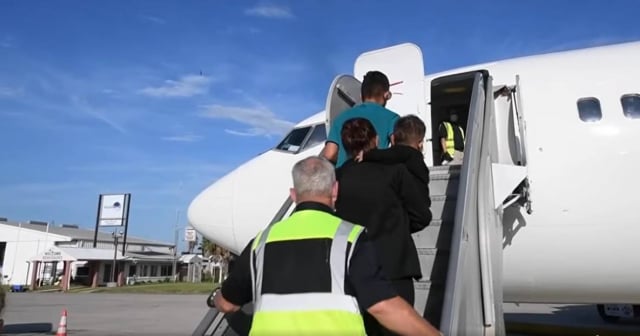The Cuban Foreign Ministry expressed its concern for the thousands of Cubans in the United States who find themselves in legal limbo under the I-220A document and called for their status in the country to be legalized as soon as possible.
Vice Chancellor Carlos Fernández de Cossío led the Cuban delegation in a round of migration talks held this Wednesday in Havana.
"We express concern about the number of Cubans in the United States living in legal limbo. They were allowed to enter the country, but have not been granted any specific legal status, and this is a significant issue for the Cuban government," stated the deputy foreign minister.
After the meeting, Cossío stated that it is "not realistic" to think about mass deportations to the island. He was referring to the warnings from elected president Donald Trump, who claims that upon his arrival in January at the White House, he will organize the largest immigrant deportation operation in the history of his country.
Cossío described Trump’s stance as "drastic and unjust," emphasizing that the mass return of Cubans would be a complex and disruptive process, given that many are already integrated into American society with established jobs and families.
The I-220A form is a supervised release permit, and more than 400,000 Cubans have received it since 2021. However, it is not recognized as an official admission document in the country, which is why these migrants continue to attend to their cases in court and pursue their regularization processes through the Cuban Adjustment Act.
The lack of clarity regarding the legal status of Cubans with I-220A in the U.S. has led to multiple demonstrations seeking their recognition as humanitarian parole.
These Cuban immigrants have work permits, but they lack other solid legal protections and face restrictions on traveling to Cuba until they become residents.
During the discussions, the Cuban side also requested the full restoration of consular services at the United States Embassy in Havana, particularly for non-immigrant visas, and criticized the restrictive measures that, according to them, foster irregular migration.
This is the last dialogue under the Biden administration, and it took place in a context of increasing migration tension between the United States and Cuba, as the island could soon become one of the countries with the highest number of immigrants to repatriate, a situation the regime wants to avoid at all costs.
Since January 2022, over 900,000 Cubans have emigrated to the United States through irregular channels, using CBP One appointments at the border or programs such as humanitarian parole.
The island is facing an unprecedented migration crisis, driven by a severe economic situation and political repression that is forcing thousands of Cubans to seek new opportunities abroad.
Frequently Asked Questions about the Immigration Status of Cubans with I-220A in the U.S.
What is the I-220A document and how does it affect Cubans in the U.S.?
The I-220A is a supervised release permit that allows Cubans to remain in the U.S. while their immigration status is being determined. However, it is not recognized as an official admission document, leaving beneficiaries in a legal limbo without access to permanent residency.
Why is the Cuban government requesting the legalization of the status of Cubans with I-220A?
The Cuban government is requesting the legalization of the status of these migrants to prevent mass deportations, as many of them are already integrated into American society with jobs and families. The lack of legal clarity creates uncertainty and impacts the stability of these individuals.
What risks do Cubans with I-220A face under a potential Trump administration?
A Trump administration could toughen immigration policies and increase deportations, posing a significant risk for Cubans with I-220A. Although this document provides a certain level of protection, it does not guarantee safety against more restrictive policies.
What legal options do Cubans with an I-220A have to regularize their status in the U.S.?
Cubans with an I-220A can seek to benefit from the Cuban Adjustment Act, which allows them to apply for residency after one year of residence in the U.S. However, due to the lack of official recognition of the I-220A as an admission document, the process can be complicated and is subject to changes in immigration policies.
How is the migration issue between the U.S. and Cuba being addressed?
The migration talks aim to ensure safe, legal, and orderly migration between the two countries. Topics such as family reunification and the reduction of irregular migration are discussed within the framework of existing bilateral agreements.
Filed under:
